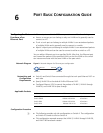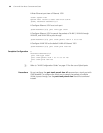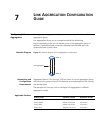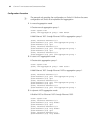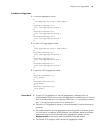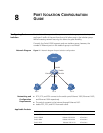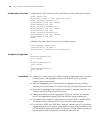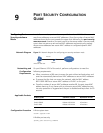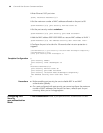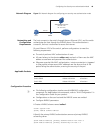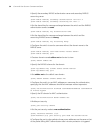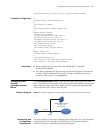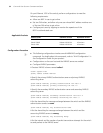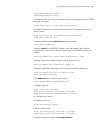46 CHAPTER 8: PORT ISOLATION CONFIGURATION GUIDE
Configuration Procedure # Add Ethernet 1/0/2, Ethernet 1/0/3, and Ethernet 1/0/4 to the isolation group.
<3Com> system-view
System View: return to User View with Ctrl+Z.
[3Com] interface ethernet1/0/2
[3Com-Ethernet1/0/2] port isolate
[3Com-Ethernet1/0/2] quit
[3Com] interface ethernet1/0/3
[3Com-Ethernet1/0/3] port isolate
[3Com-Ethernet1/0/3] quit
[3Com] interface ethernet1/0/4
[3Com-Ethernet1/0/4] port isolate
[3Com-Ethernet1/0/4] quit
[3Com]
# Display information about the ports in the isolation group.
<3Com> display isolate port
Isolated port(s) on UNIT 1:
Ethernet1/0/2, Ethernet1/0/3, Ethernet1/0/4
Complete Configuration #
interface Ethernet1/0/2
port isolate
#
interface Ethernet1/0/3
port isolate
#
interface Ethernet1/0/4
port isolate
#
Precautions ■ Adding to or removing from an isolation group an aggregated port can cause
all other ports in the aggregation group on the device to join or exit the
isolation group automatically.
■ After an aggregated port is removed from its aggregation group, all other
member ports will still stay in the isolation group that they have joined (if any).
■ Removing an aggregation group does not remove its member ports from the
isolation group that they have joined (if any).
■ Adding an isolated port to an aggregation group can cause all the member
ports in the aggregation group to join the isolation group automatically.
■ Cross-device port isolation is supported on the Switch 5500 in an XRN fabric.
This allows ports on different units to join the same isolation group.
■ For the Switch 5500 in an XRN fabric, adding a member port in a cross-device
aggregation group to an isolation group does not cause other member ports to
join the isolation group automatically. For them to join the isolation group, you
need to perform the configuration manually for each of them.




